The Maritime and Port Authority of Singapore (MPA) has renewed its partnership with Wärtsilä, the Finnish technology group, on the development of alternative fuel infrastructure, digital port operations, and simulation-based training for methanol and ammonia propulsion systems.
To prepare seafarers and port operators for handling methanol-fuelled vessels, Wärtsilä has introduced the Methanol Power and Control (PAC) simulation model. This tool has been produced through a collaboration with the Maritime Energy Training Facility (METF), a network of training facilities in Singapore, and the Wavelink Maritime Institute, and will improve the safety and efficiency of methanol-fuel handling, as well as ensuring the port is ready for new fuel technologies.
In early 2026, an equivalent model will be introduced for ammonia propulsion systems, which is indicative of the growing interest within the industry in both fuel options forming part of a multi-fuel future for the maritime sector.
MPA and Wärtsilä’s partnership also includes researching and developing new safety standards and handling procedures for low- and zero-emission fuels. This will be achieved through collaborations with companies positioned within Singapore’s MarineTech startup ecosystem, an initiative launched in May 2024 to propel innovation and investment in the maritime sector.
On 4-5 June 2025, Wärtsilä will host its ‘Simulation User Conference’ in Singapore, which is focused on improving fuel-handling training methodologies using simulation technology. This event is intended to provide a platform for industry experts to share insights on developing key competencies in handling alternative fuels and to further consolidate Singapore’s regional leadership in this area.
‘As a leading bunkering hub transitioning to a multi-fuel future, our partnership with Wärtsilä will help unlock the potential of low- and zero-emission maritime fuels’, Teo Eng Dih, Chief Executive of MPA, commented on the announcement. ‘This partnership will be an action-focused effort to ensure a safe and efficient bunkering environment in Singapore.’
In addition to the advancements in the training provided to seafarers and port operators, infrastructure changes are necessary to ensure ports are ready to facilitate the industry’s adoption of alternative fuels. MPA and Wärtsilä have stated that their partnership will push forward the digitalisation of port operations to improve the efficiency and reduce the cost of transitioning to low- and zero-emission fuels.
‘As the world’s busiest transshipment port and largest bunkering hub, Singapore has an important role to play in shipping’s journey towards net-zero’, said Håkan Agnevall, Wärtsilä President and CEO. ‘That’s why we are proud to continue fostering our partnership with MPA on accelerating this transition. The renewal of our MOU and the launch of the Methanol PAC simulation model are significant steps towards achieving our shared goals of decarbonisation and digitalisation in the maritime sector.’
As the shipping industry confronts mounting regulatory pressure and the unavailability of cost-competitive clean fuels at scale, partnerships such as this are increasingly important in achieving the infrastructural readiness needed to decarbonise maritime operations.



